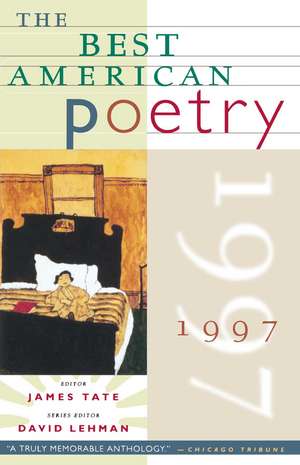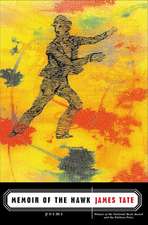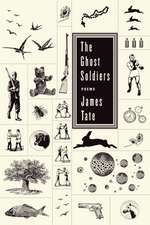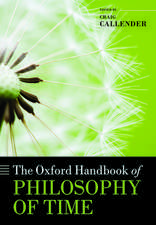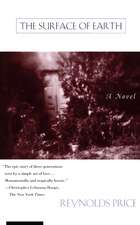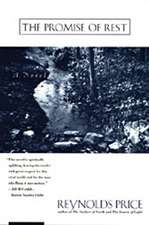The Best American Poetry 1997
Autor James Tate Editat de David Lehmanen Limba Engleză Paperback – 7 oct 1997
Preț: 109.02 lei
Nou
Puncte Express: 164
Preț estimativ în valută:
20.86€ • 21.84$ • 17.36£
20.86€ • 21.84$ • 17.36£
Carte disponibilă
Livrare economică 10-24 martie
Preluare comenzi: 021 569.72.76
Specificații
ISBN-13: 9780684814520
ISBN-10: 0684814528
Pagini: 272
Ilustrații: 1
Dimensiuni: 140 x 216 x 18 mm
Greutate: 0.29 kg
Ediția:Original
Editura: Scribner
Colecția Scribner
Locul publicării:United Kingdom
ISBN-10: 0684814528
Pagini: 272
Ilustrații: 1
Dimensiuni: 140 x 216 x 18 mm
Greutate: 0.29 kg
Ediția:Original
Editura: Scribner
Colecția Scribner
Locul publicării:United Kingdom
Notă biografică
David Lehman, the series editor of The Best American Poetry, edited The Oxford Book of American Poetry. His books of poetry include The Morning Line, When a Woman Loves a Man, and The Daily Mirror. He has written such nonfiction books as Signs of the Times: Deconstruction and the Fall of Paul de Man. He lives in New York City and Ithaca, New York.
Extras
Chapter 1
Back in the World
I took a shortcut through blood
to get back to you,
but the house where I left you is empty now.
You've packed up and moved on,
leaving this old photograph of the two of us,
taken before I left for Viet Nam.
You've cut yourself out of it,
torn your half in pieces
and lain them on the mantel,
where your knickknacks used to be:
those godawful Hummels you'd been saving for years
and a small glass vial you said
contained your grandmother's tears.
A thick film of dust comes off on my fingers,
when I rub them across the years that came to separate us.
In a corner of the living room, facing a wall,
I find my last painting of you.
In it, you lie, naked, on the old iron bed,
your head hanging over the side,
your hair, flowing to the floor
like a wide black river.
There, Max, the cat, is curled
in a grey, purring blur,
all fur and gooseberry green eyes that stare at me,
as if accusing me of some indiscretion
he doesn't dare mention.
Suddenly, he meows loudly
and rises as if he's been spooked,
runs through the house,
then swoops back to his place beside you,
and beside the night table,
on which I've painted a heart on a white plate,
and a knife and fork on a red checkered napkin.
You hate the painting. You say I'm perverse
to paint you that way, and worse, an amateur.
"Do you want to tear my heart out and eat it
like those Aztecs used to do,
so you can prove you don't need me?" you ask.
"But I do need you," I say. "That's the point."
"I don't get it," you say,
as you dress for some party
you claim you are going to, but I'm on to your game.
It's your lover who's waiting for you.
"I know who he is," I say,
"but I don't know his name,"
then I run to the bathroom,
grab a handful of Trojans
and throw them at you,
as you slam the door on me,
before I can slam it on you.
You don't come back, until you get word
that I've enlisted in the army.
I'm packing when you show up.
"You heard," I say
and you tell me that it's perverse of me too.
"Who are you kidding, you, a soldier?
And what's that?" you ask.
I give you the small canvas I've just finished.
"A sample of my new work," I say.
"There's nothing on it," you say.
"That's right," I tell you. "It's white like the plate,
after I ate your heart."
"Don't start," you say, "don't."
We part with a brief kiss like two strangers
who miss the act of pressing one mouth
against another, yet resist, resist.
We part on a day just like this,
a day that seems as if it will never end,
in an explosion that sends my body
flying through the air
in the white glare of morning,
when without warning, I step on a landmine
and regain consciousness to find
I'm a notation on a doctor's chart that says,
BK amputee.
Now I imagine myself racing through the house
just as Max did once,
only to return to myself, to the bed,
the night table, the canvas in my lap
and my brush, poised above it.
When Max, toothless and so old,
his hair comes out in clumps, when I touch him,
half sits, half collapses beside my wheelchair,
I begin to paint, first a black background,
then starting from the left side,
a white line, beside a red line
beside a white, beside a red,
each one getting smaller and smaller,
until they disappear off the edge of the canvas.
I title it "Amateur."
I call it art.
from Quarterly West
Copyright © 1997 by David Lehman
Foreword copyright © 1997 by David Lehman
Introduction copyright © 1997 by James Tate
Back in the World
I took a shortcut through blood
to get back to you,
but the house where I left you is empty now.
You've packed up and moved on,
leaving this old photograph of the two of us,
taken before I left for Viet Nam.
You've cut yourself out of it,
torn your half in pieces
and lain them on the mantel,
where your knickknacks used to be:
those godawful Hummels you'd been saving for years
and a small glass vial you said
contained your grandmother's tears.
A thick film of dust comes off on my fingers,
when I rub them across the years that came to separate us.
In a corner of the living room, facing a wall,
I find my last painting of you.
In it, you lie, naked, on the old iron bed,
your head hanging over the side,
your hair, flowing to the floor
like a wide black river.
There, Max, the cat, is curled
in a grey, purring blur,
all fur and gooseberry green eyes that stare at me,
as if accusing me of some indiscretion
he doesn't dare mention.
Suddenly, he meows loudly
and rises as if he's been spooked,
runs through the house,
then swoops back to his place beside you,
and beside the night table,
on which I've painted a heart on a white plate,
and a knife and fork on a red checkered napkin.
You hate the painting. You say I'm perverse
to paint you that way, and worse, an amateur.
"Do you want to tear my heart out and eat it
like those Aztecs used to do,
so you can prove you don't need me?" you ask.
"But I do need you," I say. "That's the point."
"I don't get it," you say,
as you dress for some party
you claim you are going to, but I'm on to your game.
It's your lover who's waiting for you.
"I know who he is," I say,
"but I don't know his name,"
then I run to the bathroom,
grab a handful of Trojans
and throw them at you,
as you slam the door on me,
before I can slam it on you.
You don't come back, until you get word
that I've enlisted in the army.
I'm packing when you show up.
"You heard," I say
and you tell me that it's perverse of me too.
"Who are you kidding, you, a soldier?
And what's that?" you ask.
I give you the small canvas I've just finished.
"A sample of my new work," I say.
"There's nothing on it," you say.
"That's right," I tell you. "It's white like the plate,
after I ate your heart."
"Don't start," you say, "don't."
We part with a brief kiss like two strangers
who miss the act of pressing one mouth
against another, yet resist, resist.
We part on a day just like this,
a day that seems as if it will never end,
in an explosion that sends my body
flying through the air
in the white glare of morning,
when without warning, I step on a landmine
and regain consciousness to find
I'm a notation on a doctor's chart that says,
BK amputee.
Now I imagine myself racing through the house
just as Max did once,
only to return to myself, to the bed,
the night table, the canvas in my lap
and my brush, poised above it.
When Max, toothless and so old,
his hair comes out in clumps, when I touch him,
half sits, half collapses beside my wheelchair,
I begin to paint, first a black background,
then starting from the left side,
a white line, beside a red line
beside a white, beside a red,
each one getting smaller and smaller,
until they disappear off the edge of the canvas.
I title it "Amateur."
I call it art.
from Quarterly West
Copyright © 1997 by David Lehman
Foreword copyright © 1997 by David Lehman
Introduction copyright © 1997 by James Tate
Cuprins
CONTENTS
Foreword by David Lehman
Introduction by James Tate
Ai, "Back in the World"
Sherman Alexie, "The Exaggeration of Despair"
Agha Shahid Ali, "Return to Harmony 3"
A. R. Ammons, from "Strip"
Nin Andrews, "That Cold Summer"
L. S. Asekoff, "Rounding the Horn"
John Ashbery, "The Problem of Anxiety"
Marianne Boruch, "Camouflage"
Catherine Bowman, "No Sorry"
Joseph Brodsky, "Love Song"
Stephanie Brown, "Feminine Intuition"
Joshua Clover, "The Map Room"
Billy Collins, "Lines Lost Among Trees"
Gillian Conoley, "The Sky Drank In"
Jayne Cortez, "The Heavy Headed Dance"
Robert Creeley, "Won't It Be Fine?"
Carl Dennis, "History"
William Dickey, "The Death of John Berryman"
Robert Dow, "How Should I Say This?"
Thomas Sayers Ellis, "Atomic Bride"
Irving Feldman, "You Know What I'm Saying?"
Herman Fong, "Asylum"
Dick Gallup, "Backing into the Future"
Martin Galvin, "Introductions"
Amy Gerstler, "A Fan Letter"
Allen Ginsberg, "Is About"
Dana Gioia, "The Litany"
Elton Glaser, "Smoking"
Kate Gleason, "After Fighting for Hours"
Albert Goldbarth, "Complete with Starry Night and Bourbon Shots"
Jorie Graham, "Thinking"
Donald Hall, "The Porcelain Couple"
Daniel Halpern, "Her Body"
Robert Hass, "Interrupted Meditation"
Bob Hicok, "Heroin"
Paul Hoover, "California"
Christine Hume, "Helicopter Wrecked on a Hill"
Harry Humes, "The Butterfly Effect"
Don Hymans, "Passacaglia"
Lawson Fusao Inada, "Making It Stick"
Richard Jackson, "The Poem That Was Once Called 'Desperate' But Is Now Striving to Become the Perfect Love Poem"
Gray Jacobik, "Dust Storm"
George Kalamaras, "Mud"
Jennifer L. Knox, "The Bright Light of Responsibility"
Philip Kobylarz, "A Bill, Posted"
Yusef Komunyakaa, "Jeanne Duval's Confession"
Elizabeth Kostova, "Suddenly I Realized I Was Sitting"
Denise Levertov, "The Change"
Larry Levis, "Anastasia and Sandman"
Matthew Lippman, "Hallelujah Terrible"
Beth Lisick, "Empress of Sighs"
Khaled Mattawa, "Heartsong"
William Matthews, "Vermin"
Josip Novakovich, "Shadow"
Geoffrey Nutter, from A Summer Evening
Catie Rosemurgy, "Mostly Mick Jagger"
Clare Rossini, "Valediction"
Mary Ruefle, "Topophilia"
Hillel Schwartz, "Recruiting Poster"
Maureen Seaton, "Fiddleheads"
pardVijay Seshadri, "Lifeline"
Steven Sherrill, "Katyn Forest"
Charles Simic, "The Something"
Charlie Smith, "Beds"
Leon Stokesbury, "Evening's End"
Mark Strand, "Morning, Noon and Night"
Jack Turner, "The Plan"
Karen Volkman, "Infernal"
Derek Walcott, "Italian Eclogues"
Rosanna Warren, "Diversion"
Lewis Warsh, "Downward Mobility"
Terence Winch, "Shadow Grammar"
Eve Wood, "Recognition"
Charles Wright, "Disjecta Membra"
Dean Young, "Frottage"
Contributors' Notes and Comments
Magazines Where the Poems Were First Published
Acknowledgments
Cumulative Series Index
Recenzii
Chicago Tribune A truly memorable anthology.
